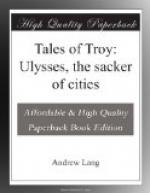After Ulysses was wounded, early in this great battle, he was not able to fight for several days, and, as the story is about Ulysses, we must tell quite shortly how Achilles returned to the war to take vengeance for Patroclus, and how he slew Hector. When Patroclus fell, Hector seized the armour which the Gods had given to Peleus, and Peleus to his son Achilles, while Achilles had lent it to Patroclus that he might terrify the Trojans. Retiring out of reach of spears, Hector took off his own armour and put on that of Achilles, and Greeks and Trojans fought for the dead body of Patroclus. Then Zeus, the chief of the Gods, looked down and said that Hector should never come home out of the battle to his wife, Andromache. But Hector returned into the fight around the dead Patroclus, and here all the best men fought, and even Automedon, who had been driving the chariot of Patroclus. Now when the Trojans seemed to have the better of the fight, the Greeks sent Antilochus, a son of old Nestor, to tell Achilles that his friend was slain, and Antilochus ran, and Aias and his brother protected the Greeks who were trying to carry the body of Patroclus back to the ships.
Swiftly Antilochus came running to Achilles, saying: “Fallen is Patroclus, and they are fighting round his naked body, for Hector has his armour.” Then Achilles said never a word, but fell on the floor of his hut, and threw black ashes on his yellow hair, till Antilochus seized his hands, fearing that he would cut his own throat with his dagger, for very sorrow. His mother, Thetis, arose from the sea to comfort him, but he said that he desired to die if he could not slay Hector, who had slain his friend. Then Thetis told him that he could not fight without armour, and now he had none; but she would go to the God of armour-making and bring from him such a shield and helmet and breastplate as had never been seen by men.
Meanwhile the fight raged round the dead body of Patroclus, which was defiled with blood and dust, near the ships, and was being dragged this way and that, and torn and wounded. Achilles could not bear this sight, yet his mother had warned him not to enter without armour the battle where stones and arrows and spears were flying like hail; and he was so tall and broad that he could put on the arms of no other man. So he went down to the ditch as he was, unarmed, and as he stood high above it, against the red sunset, fire seemed to flow from his golden hair like the beacon blaze that soars into the dark sky when an island town is attacked at night, and men light beacons that their neighbours may see them and come to their help from other isles. There Achilles stood in a splendour of fire, and he shouted aloud, as clear as a clarion rings when men fall on to attack a besieged city wall. Thrice Achilles shouted mightily, and thrice the horses of the Trojans shuddered for fear and turned back from the onslaught,—and thrice the men of Troy were confounded and shaken with terror. Then the Greeks drew the body of Patroclus out of the dust and the arrows, and laid him on a bier, and Achilles followed, weeping, for he had sent his friend with chariot and horses to the war; but home again he welcomed him never more. Then the sun set and it was night.




